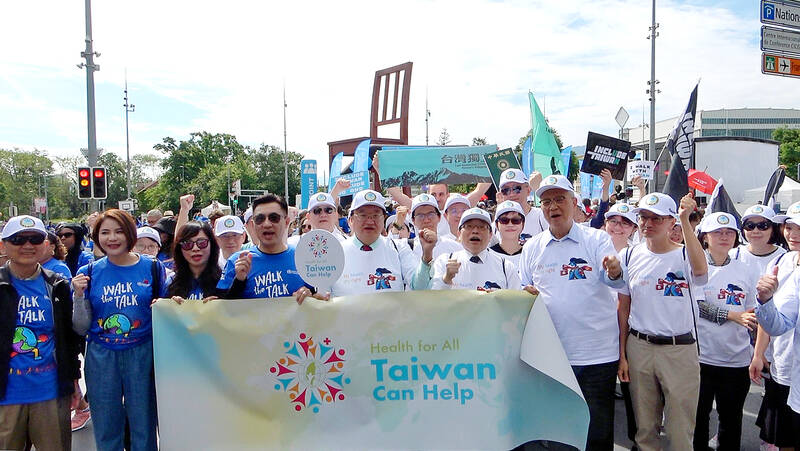No one should be excluded from the World Health Assembly (WHA), Vice President Hsiao Bi-khim (蕭美琴) said yesterday, adding that Taiwan is capable and willing to be a member of the global health forum.
Hsiao made the remark in a speech at the Aesthetic Medicine World Congress and Taiwan Dermatology Aesthetics Conference (AMWC Asia-TDAC) in Taipei.
The WHA, the annual meeting of the WHO’s decisionmaking body, is scheduled to begin its first day in Geneva, Switzerland, today, but as of yesterday, Taiwan has not received an invitation to participate as an observer.

Photo: CNA
Hsiao said that the AMWC Asia-TDAC provides an opportunity for experts from various fields to learn from each other and facilitate interdisciplinary cooperation, integrating medical knowledge from different dermatology-related fields, to create a healthier world.
Attending the conference allowed her to witness the participants’ focus and dedication to the medical fields, strengthening her belief that Taiwan can contribute to international healthcare advancement, she added.
A lesson learned from the COVID-19 pandemic is that “no one should be left behind,” she said, adding that Taiwan is capable and willing to be a member of the global health forum, and that the nation’s participation in international medical and health-related communities is necessary.
Meanwhile, a governmental delegation “WHA Action Team” led by Minister of Health and Welfare Chiu Tai-yuan (邱泰源), a separate promotional group led by civic organizations and a bipartisan legislative group led by Deputy Legislative Speaker Johnny Chiang (江啟臣) have arrived in Geneva to promote the country’s participation in the UN agency.
On Saturday, they attended the opening of a “World Health We Share” exhibition at Geneva Airport train station that was held to promote Taiwan’s healthcare.
Health is a fundamental human right and a universal value, but Taiwan is denied participation due to political interference, Chiu said, adding that this is deeply disappointing.
Although it was not invited to the WHA, Taiwan has strong soft power in the medical and health fields, he said, adding that he is grateful that the civic promotional team is holding an exhibition at the train station for more WHA attendees to learn about Taiwan’s healthcare capabilities.
Taiwan participated in the WHA from 2009 to 2016 as an observer under the name “Chinese Taipei” when relations with China under the then-Chinese Nationalist Party (KMT) administration were better.
Since the Democratic Progressive Party took power in 2016, relations with China have deteriorated, and Beijing has blocked Taiwan’s attempts to participate in UN-affiliated organizations.
Facing China’s suppression, several democratic countries have voiced support for Taiwan’s participation.
Japanese Minister for Foreign Affairs Yoshimasa Hayashi on Friday said that the G7 countries, including Japan, have expressed their support for Taiwan’s meaningful participation in the WHA.
Some of the items that would be discusses at this year’s WHA include the global health governance framework, climate change and health, the 14th General Programme of Work as well as whether Taiwan should be invited to participate as an observer.
As some of Taiwan’s diplomatic allies have called for a motion on Taiwan’s inclusion on the agenda of the WHA, a review on whether to include the issue in the agenda would be held at the WHA General Committee at 8:30pm Taiwan time today.
Additional reporting by Yang Yao-ru and CNA

Nipah virus infection is to be officially listed as a category 5 notifiable infectious disease in Taiwan in March, while clinical treatment guidelines are being formulated, the Centers for Disease Control (CDC) said yesterday. With Nipah infections being reported in other countries and considering its relatively high fatality rate, the centers on Jan. 16 announced that it would be listed as a notifiable infectious disease to bolster the nation’s systematic early warning system and increase public awareness, the CDC said. Bangladesh reported four fatal cases last year in separate districts, with three linked to raw date palm sap consumption, CDC Epidemic Intelligence

The manufacture of the remaining 28 M1A2T Abrams tanks Taiwan purchased from the US has recently been completed, and they are expected to be delivered within the next one to two months, a source said yesterday. The Ministry of National Defense is arranging cargo ships to transport the tanks to Taiwan as soon as possible, said the source, who is familiar with the matter. The estimated arrival time ranges from late this month to early next month, the source said. The 28 Abrams tanks make up the third and final batch of a total of 108 tanks, valued at about NT$40.5 billion

Two Taiwanese prosecutors were questioned by Chinese security personnel at their hotel during a trip to China’s Henan Province this month, the Mainland Affairs Council (MAC) said yesterday. The officers had personal information on the prosecutors, including “when they were assigned to their posts, their work locations and job titles,” MAC Deputy Minister and spokesman Liang Wen-chieh (梁文傑) said. On top of asking about their agencies and positions, the officers also questioned the prosecutors about the Cross-Strait Joint Crime-Fighting and Judicial Mutual Assistance Agreement, a pact that serves as the framework for Taiwan-China cooperation on combating crime and providing judicial assistance, Liang

A group from the Taiwanese Designers in Australia association yesterday represented Taiwan at the Midsumma Pride March in Melbourne. The march, held in the St. Kilda suburb, is the city’s largest LGBTQIA+ parade and the flagship event of the annual Midsumma Festival. It attracted more than 45,000 spectators who supported the 400 groups and 10,000 marchers that participated this year, the association said. Taiwanese Designers said they organized a team to march for Taiwan this year, joining politicians, government agencies, professionals and community organizations in showing support for LGBTQIA+ people and diverse communities. As the first country in Asia to legalize same-sex